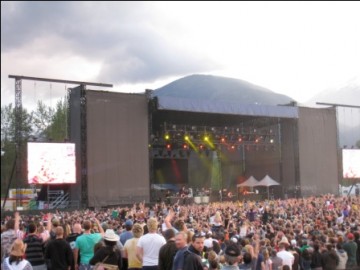The Mass Gathering Medicine (MGM) Online Registry Project will help inform the research initiatives of the UBC Department of Emergency Medicine’s Mass Gathering Medicine Interest Group for years to come. It is a multi-disciplinary, multi-agency collaborative which will ultimately serve to improve the level of care that we all provide at races, charity walks, concerts, festivals and other community events.
Background
 The MGM Online Registry Project began following the successful implementation of a complex medical response for the Pemberton Music Festival in the summer of 2008. The need for planning was paramount, as some aspects of the event were high risk, and it was hosted in a community that was more rural than similar events. As such, the medical infrastructure for that event was beyond the capacity of the city’s usual emergency response planning. Team members involved in this, many of whom had decades of experience with other MGM events, began to discuss the possibility of approaching MGM response planning in a more rigorous, scholarly fashion. Most of the MGM literature is based in expert opinion at best, and we wanted to find a way of elevating the level of evidence available for MGM scholars. We realized that without a comprehensive understanding of the population of EVENTS and the population of PATIENTS presenting at these events, we’d be speculating on many recommendations that we would consider. From this, the MGM Registry was born.
The MGM Online Registry Project began following the successful implementation of a complex medical response for the Pemberton Music Festival in the summer of 2008. The need for planning was paramount, as some aspects of the event were high risk, and it was hosted in a community that was more rural than similar events. As such, the medical infrastructure for that event was beyond the capacity of the city’s usual emergency response planning. Team members involved in this, many of whom had decades of experience with other MGM events, began to discuss the possibility of approaching MGM response planning in a more rigorous, scholarly fashion. Most of the MGM literature is based in expert opinion at best, and we wanted to find a way of elevating the level of evidence available for MGM scholars. We realized that without a comprehensive understanding of the population of EVENTS and the population of PATIENTS presenting at these events, we’d be speculating on many recommendations that we would consider. From this, the MGM Registry was born.
Purpose
The purpose the MGM Registry is to create a collection of data from a variety of mass gathering and mass participation events for scholarly analysis, hypothesis generation and testing.
Event Data
By collecting detailed information from a large variety of events, we hope to learn how to better describe seemingly different events. By focussing on good event description, we will begin to identify the features of events that contribute to higher health care needs for guests and other participants, as well as identifying features of events and the medical response teams associated with lower needs and lower transfer to hospital rates. These observations may help in predicting an appropriate level of response for similar events prospectively.
Patient Data
As well as describing the events in detail, a full description of the patients cared for at each event will permit an improved understanding of the types of patient problems associated with particular types of events. In addition, by collecting data at many events over many years, we have a higher probability of capturing more of the patient presentations that we see uncommonly, but must be prepared for (i.e. critically ill patients at MGM events).
Methodology
We did a comprehensive review of the literature and communicated with internationally recognized experts in MGM to determine the fields necessary to adequately describe the wide variety of MGM events in our communities and beyond. For the patient fields, we reviewed the MGM literature and collated patient encounter forms from numerous agencies and events, and derived a comprehensive list. From this, we were able to generate an online database to collect these fields in a standardized manner. In addition, we created fields of our own for both event description and patient presentations to address some unique research questions that we have based on our own experience in MGM event coverage.
The result is this Registry. We welcome collaborators form other cities, countries, and organizations to partner with us to capture the broadest sampling of MGM data.
For more information, or if you would like to become a collaborator on the UBC MGM Online Registry Project, please contact adam@ubcmgm.ca.
Thank you to everyone who helps us with our data collection!
